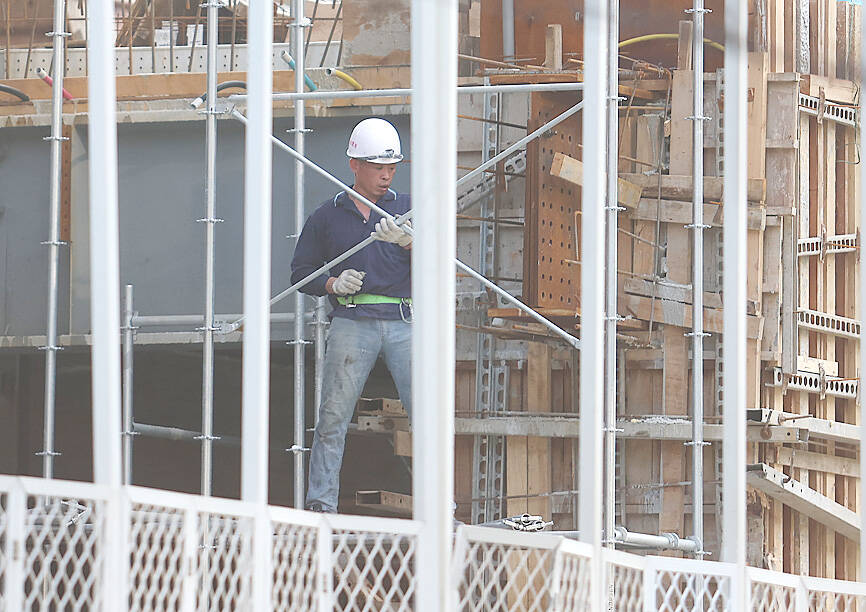Business confidence last month remained mostly steady among local manufacturers and service providers, but declined for construction companies due to lingering holiday disruptions, the Taiwan Institute of Economic Research (TIER, 台灣經濟研究院) said yesterday.
The business sentiment for the manufacturing industry rose to 98.18, an increase of 0.06 points from January and gaining for three consecutive months, the Taipei-based think tank said.
However, 11.7 percent of firms reported better performance last month, falling 19.8 percentage points from a month earlier, while 36.7 percent posted a decline in business, up 14.8 percentage points, TIER said, attributing the results to fewer working days due to the Lunar New Year holiday.

Photo: CNA
However, 50.2 percent of firms are looking at business improvements in the coming six months, a steep rise of 22.6 percentage points from one month earlier, with only 11.1 percent expecting things to worsen, falling from 19.8 percent one month earlier, TIER said.
Manufacturers of chemical, machinery equipment and electrical products are relatively positive, while suppliers of base metals hold flat views, it said.
The confidence gauge for service providers dropped 0.46 points to 92.72 last month, also due to the holiday effect, TIER said.
Firms in the hospitality, insurance and shipping sectors are slightly more upbeat about their business outlook, whereas retailers, banking institutes and securities houses expect flat showings ahead, it said.
TIER said that recent TAIEX rallies elevated the risks of profit-taking by foreign institutional players and caused some securities brokerages to turn cautious over the stock market’s prospects over the next six months.
The sentiment measure for construction companies and real-estate brokers weakened 2.82 points to 103.66 last month, ending three months of increases, TIER said, adding that fewer working days and labor shortages were to blame for the retreat.
The central bank’s latest interest rate hike, the first since the first quarter of last year, is not expected to cool down the property market and is unlikely to affect first-home purchases as the government would absorb the extra borrowing costs, TIER said.
Government data showed that housing transactions in the first two months grew 40.1 percent from a year earlier in the six special municipalities, supported by first-home purchases to take advantage of interest subsidies the government introduced in August last year.

When an apartment comes up for rent in Germany’s big cities, hundreds of prospective tenants often queue down the street to view it, but the acute shortage of affordable housing is getting scant attention ahead of today’s snap general election. “Housing is one of the main problems for people, but nobody talks about it, nobody takes it seriously,” said Andreas Ibel, president of Build Europe, an association representing housing developers. Migration and the sluggish economy top the list of voters’ concerns, but analysts say housing policy fails to break through as returns on investment take time to register, making the

‘SILVER LINING’: Although the news caused TSMC to fall on the local market, an analyst said that as tariffs are not set to go into effect until April, there is still time for negotiations US President Donald Trump on Tuesday said that he would likely impose tariffs on semiconductor, automobile and pharmaceutical imports of about 25 percent, with an announcement coming as soon as April 2 in a move that would represent a dramatic widening of the US leader’s trade war. “I probably will tell you that on April 2, but it’ll be in the neighborhood of 25 percent,” Trump told reporters at his Mar-a-Lago club when asked about his plan for auto tariffs. Asked about similar levies on pharmaceutical drugs and semiconductors, the president said that “it’ll be 25 percent and higher, and it’ll

NOT TO WORRY: Some people are concerned funds might continue moving out of the country, but the central bank said financial account outflows are not unusual in Taiwan Taiwan’s outbound investments hit a new high last year due to investments made by contract chipmaker Taiwan Semiconductor Manufacturing Co (TSMC, 台積電) and other major manufacturers to boost global expansion, the central bank said on Thursday. The net increase in outbound investments last year reached a record US$21.05 billion, while the net increase in outbound investments by Taiwanese residents reached a record US$31.98 billion, central bank data showed. Chen Fei-wen (陳斐紋), deputy director of the central bank’s Department of Economic Research, said the increase was largely due to TSMC’s efforts to expand production in the US and Japan. Investments by Vanguard International

WARNING SHOT: The US president has threatened to impose 25 percent tariffs on all imported vehicles, and similar or higher duties on pharmaceuticals and semiconductors US President Donald Trump on Wednesday suggested that a trade deal with China was “possible” — a key target in the US leader’s tariffs policy. The US in 2020 had already agreed to “a great trade deal with China” and a new deal was “possible,” Trump said. Trump said he expected Chinese President Xi Jinping (習近平) to visit the US, without giving a timeline for his trip. Trump also said that he was talking to China about TikTok, as the US seeks to broker a sale of the popular app owned by Chinese firm ByteDance Ltd (字節跳動). Trump last week said that he had